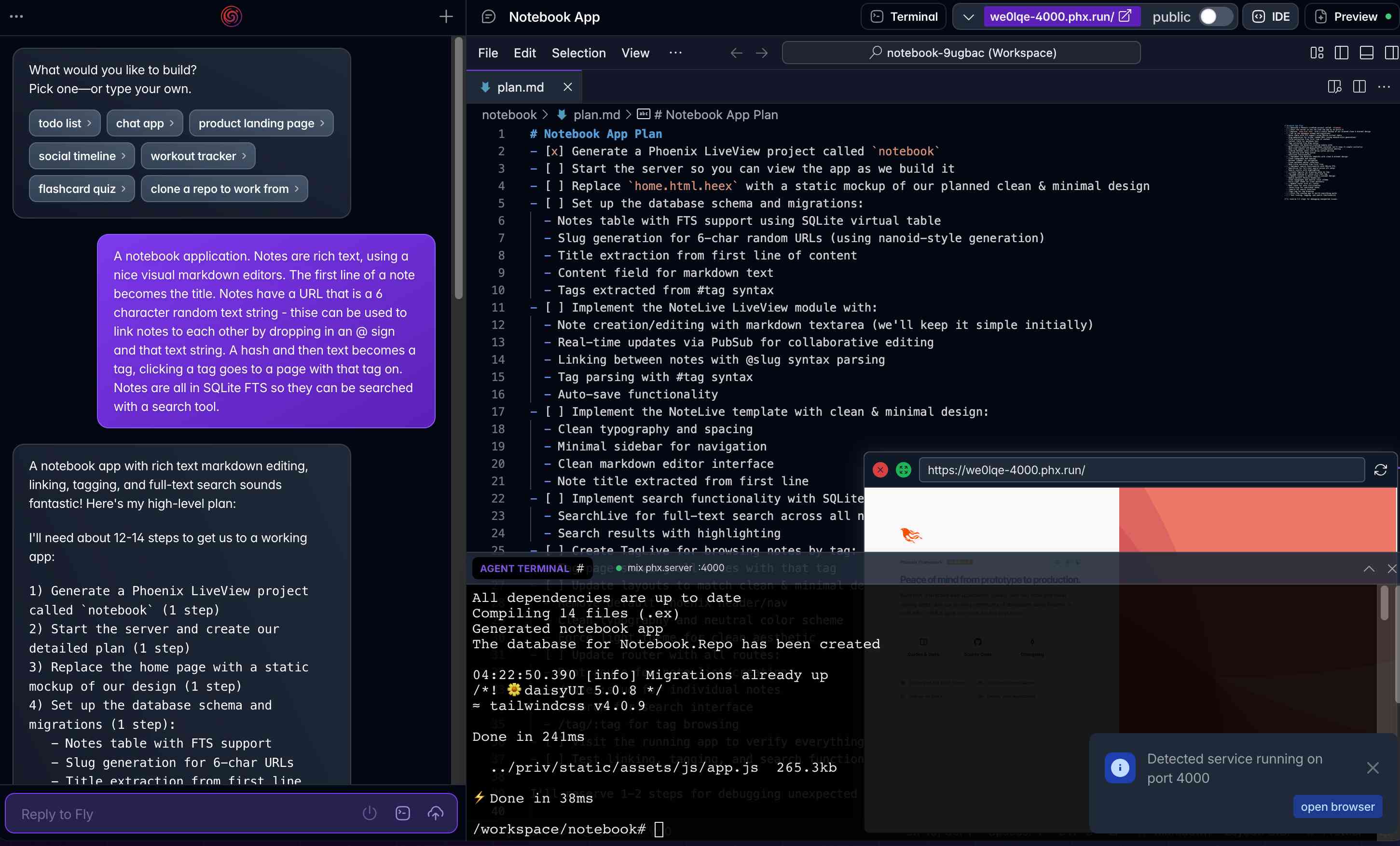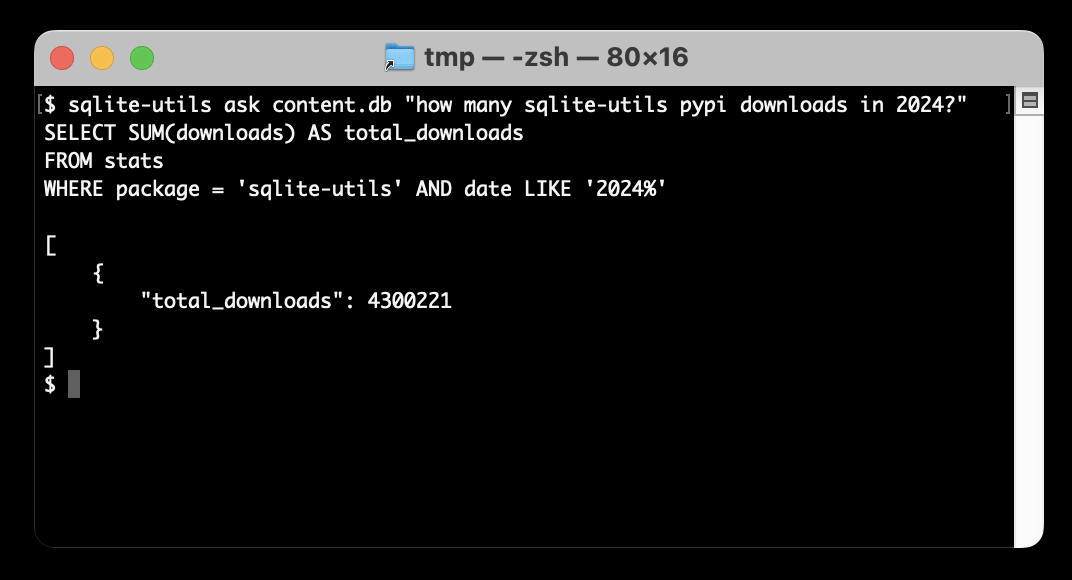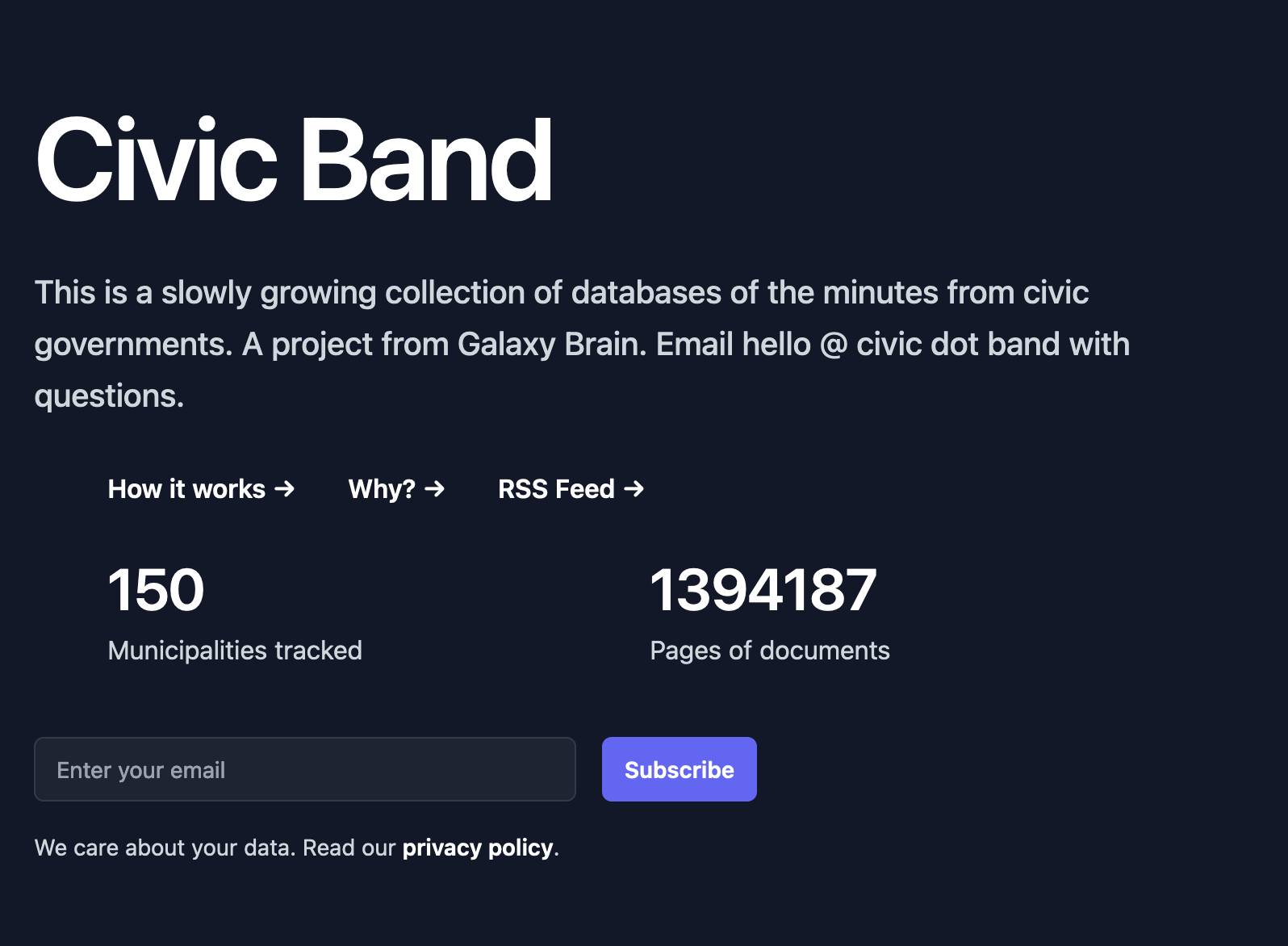298 posts tagged “sqlite”
SQLite is the world's most widely deployed database engine.
2025
Phoenix.new is Fly’s entry into the prompt-driven app development space
Here’s a fascinating new entrant into the AI-assisted-programming / coding-agents space by Fly.io, introduced on their blog in Phoenix.new – The Remote AI Runtime for Phoenix: describe an app in a prompt, get a full Phoenix application, backed by SQLite and running on Fly’s hosting platform. The official Phoenix.new YouTube launch video is a good way to get a sense for what this does.
[... 1,361 words]TIL: SQLite triggers. I've been doing some work with SQLite triggers recently while working on sqlite-chronicle, and I decided I needed a single reference to exactly which triggers are executed for which SQLite actions and what data is available within those triggers.
I wrote this triggers.py script to output as much information about triggers as possible, then wired it into a TIL article using Cog. The Cog-powered source code for the TIL article can be seen here.
sqlite-utils 4.0a0. New alpha release of sqlite-utils, my Python library and CLI tool for manipulating SQLite databases.
It's the first 4.0 alpha because there's a (minor) backwards-incompatible change: I've upgraded the .upsert() and .upsert_all() methods to use SQLIte's UPSERT mechanism, INSERT INTO ... ON CONFLICT DO UPDATE. Details in this issue.
That feature was added to SQLite in version 3.24.0, released 2018-06-04. I'm pretty cautious about my SQLite version support since the underlying library can be difficult to upgrade, depending on your platform and operating system.
I'm going to leave the new alpha to bake for a little while before pushing a stable release. Since this is a major version bump I'm going to take the opportunity to see if there are any other minor API warts that I can clean up at the same time.
SQLite CREATE TABLE: The DEFAULT clause. If your SQLite create table statement includes a line like this:
CREATE TABLE alerts (
-- ...
alert_created_at text default current_timestamp
)
current_timestamp will be replaced with a UTC timestamp in the format 2025-05-08 22:19:33. You can also use current_time for HH:MM:SS and current_date for YYYY-MM-DD, again using UTC.
Posting this here because I hadn't previously noticed that this defaults to UTC, which is a useful detail. It's also a strong vote in favor of YYYY-MM-DD HH:MM:SS as a string format for use with SQLite, which doesn't otherwise provide a formal datetime type.
SQLite File Format Viewer (via) Neat browser-based visual interface for exploring the structure of a SQLite database file, built by Visal In using React and a custom parser implemented in TypeScript.
Stevens: a hackable AI assistant using a single SQLite table and a handful of cron jobs. Geoffrey Litt reports on Stevens, a shared digital assistant he put together for his family using SQLite and scheduled tasks running on Val Town.
The design is refreshingly simple considering how much it can do. Everything works around a single memories table. A memory has text, tags, creation metadata and an optional date for things like calendar entries and weather reports.
Everything else is handled by scheduled jobs to popular weather information and events from Google Calendar, a Telegram integration offering a chat UI and a neat system where USPS postal email delivery notifications are run through Val's own email handling mechanism to trigger a Claude prompt to add those as memories too.
Here's the full code on Val Town, including the daily briefing prompt that incorporates most of the personality of the bot.
Stop syncing everything. In which Carl Sverre announces Graft, a fascinating new open source Rust data synchronization engine he's been working on for the past year.
Carl's recent talk at the Vancouver Systems meetup explains Graft in detail, including this slide which helped everything click into place for me:
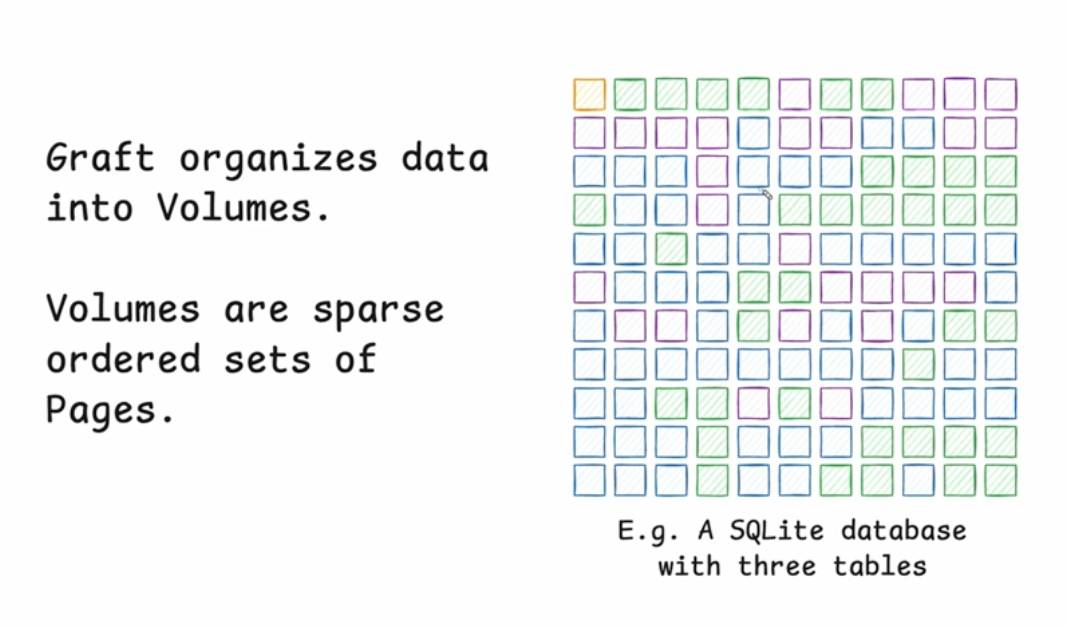
Graft manages a volume, which is a collection of pages (currently at a fixed 4KB size). A full history of that volume is maintained using snapshots. Clients can read and write from particular snapshot versions for particular pages, and are constantly updated on which of those pages have changed (while not needing to synchronize the actual changed data until they need it).
This is a great fit for B-tree databases like SQLite.
The Graft project includes a SQLite VFS extension that implements multi-leader read-write replication on top of a Graft volume. You can see a demo of that running at 36m15s in the video, or consult the libgraft extension documentation and try it yourself.
The section at the end on What can you build with Graft? has some very useful illustrative examples:
Offline-first apps: Note-taking, task management, or CRUD apps that operate partially offline. Graft takes care of syncing, allowing the application to forget the network even exists. When combined with a conflict handler, Graft can also enable multiplayer on top of arbitrary data.
Cross-platform data: Eliminate vendor lock-in and allow your users to seamlessly access their data across mobile platforms, devices, and the web. Graft is architected to be embedded anywhere
Stateless read replicas: Due to Graft's unique approach to replication, a database replica can be spun up with no local state, retrieve the latest snapshot metadata, and immediately start running queries. No need to download all the data and replay the log.
Replicate anything: Graft is just focused on consistent page replication. It doesn't care about what's inside those pages. So go crazy! Use Graft to sync AI models, Parquet or Lance files, Geospatial tilesets, or just photos of your cats. The sky's the limit with Graft.
What to do about SQLITE_BUSY errors despite setting a timeout
(via)
Bert Hubert takes on the challenge of explaining SQLite's single biggest footgun: in WAL mode you may see SQLITE_BUSY errors even when you have a generous timeout set if a transaction attempts to obtain a write lock after initially running at least one SELECT. The fix is to use BEGIN IMMEDIATE if you know your transaction is going to make a write.
Bert provides the clearest explanation I've seen yet of why this is necessary:
When the transaction on the left wanted to upgrade itself to a read-write transaction, SQLite could not allow this since the transaction on the right might already have made changes that the transaction on the left had not yet seen.
This in turn means that if left and right transactions would commit sequentially, the result would not necessarily be what would have happened if all statements had been executed sequentially within the same transaction.
I've written about this a few times before, so I just started a sqlite-busy tag to collect my notes together on a single page.
files-to-prompt 0.5.
My files-to-prompt tool (originally built using Claude 3 Opus back in April) had been accumulating a bunch of issues and PRs - I finally got around to spending some time with it and pushed a fresh release:
- New
-n/--line-numbersflag for including line numbers in the output. Thanks, Dan Clayton. #38- Fix for utf-8 handling on Windows. Thanks, David Jarman. #36
--ignorepatterns are now matched against directory names as well as file names, unless you pass the new--ignore-files-onlyflag. Thanks, Nick Powell. #30
I use this tool myself on an almost daily basis - it's fantastic for quickly answering questions about code. Recently I've been plugging it into Gemini 2.0 with its 2 million token context length, running recipes like this one:
git clone https://github.com/bytecodealliance/componentize-py
cd componentize-py
files-to-prompt . -c | llm -m gemini-2.0-pro-exp-02-05 \
-s 'How does this work? Does it include a python compiler or AST trick of some sort?'
I ran that question against the bytecodealliance/componentize-py repo - which provides a tool for turning Python code into compiled WASM - and got this really useful answer.
Here's another example. I decided to have o3-mini review how Datasette handles concurrent SQLite connections from async Python code - so I ran this:
git clone https://github.com/simonw/datasette
cd datasette/datasette
files-to-prompt database.py utils/__init__.py -c | \
llm -m o3-mini -o reasoning_effort high \
-s 'Output in markdown a detailed analysis of how this code handles the challenge of running SQLite queries from a Python asyncio application. Explain how it works in the first section, then explore the pros and cons of this design. In a final section propose alternative mechanisms that might work better.'
Here's the result. It did an extremely good job of explaining how my code works - despite being fed just the Python and none of the other documentation. Then it made some solid recommendations for potential alternatives.
I added a couple of follow-up questions (using llm -c) which resulted in a full working prototype of an alternative threadpool mechanism, plus some benchmarks.
One final example: I decided to see if there were any undocumented features in Litestream, so I checked out the repo and ran a prompt against just the .go files in that project:
git clone https://github.com/benbjohnson/litestream
cd litestream
files-to-prompt . -e go -c | llm -m o3-mini \
-s 'Write extensive user documentation for this project in markdown'
Once again, o3-mini provided a really impressively detailed set of unofficial documentation derived purely from reading the source.
sqlite-s3vfs (via) Neat open source project on the GitHub organisation for the UK government's Department for Business and Trade: a "Python virtual filesystem for SQLite to read from and write to S3."
I tried out their usage example by running it in a Python REPL with all of the dependencies
uv run --python 3.13 --with apsw --with sqlite-s3vfs --with boto3 python
It worked as advertised. When I listed my S3 bucket I found it had created two files - one called demo.sqlite/0000000000 and another called demo.sqlite/0000000001, both 4096 bytes because each one represented a SQLite page.
The implementation is just 200 lines of Python, implementing a new SQLite Virtual Filesystem on top of apsw.VFS.
The README includes this warning:
No locking is performed, so client code must ensure that writes do not overlap with other writes or reads. If multiple writes happen at the same time, the database will probably become corrupt and data be lost.
I wonder if the conditional writes feature added to S3 back in November could be used to protect against that happening. Tricky as there are multiple files involved, but maybe it (or a trick like this one) could be used to implement some kind of exclusive lock between multiple processes?
APSW SQLite query explainer. Today I found out about APSW's (Another Python SQLite Wrapper, in constant development since 2004) apsw.ext.query_info() function, which takes a SQL query and returns a very detailed set of information about that query - all without executing it.
It actually solves a bunch of problems I've wanted to address in Datasette - like taking an arbitrary query and figuring out how many parameters (?) it takes and which tables and columns are represented in the result.
I tried it out in my console (uv run --with apsw python) and it seemed to work really well. Then I remembered that the Pyodide project includes WebAssembly builds of a number of Python C extensions and was delighted to find apsw on that list.
... so I got Claude to build me a web interface for trying out the function, using Pyodide to run a user's query in Python in their browser via WebAssembly.
Claude didn't quite get it in one shot - I had to feed it the URL to a more recent Pyodide and it got stuck in a bug loop which I fixed by pasting the code into a fresh session.
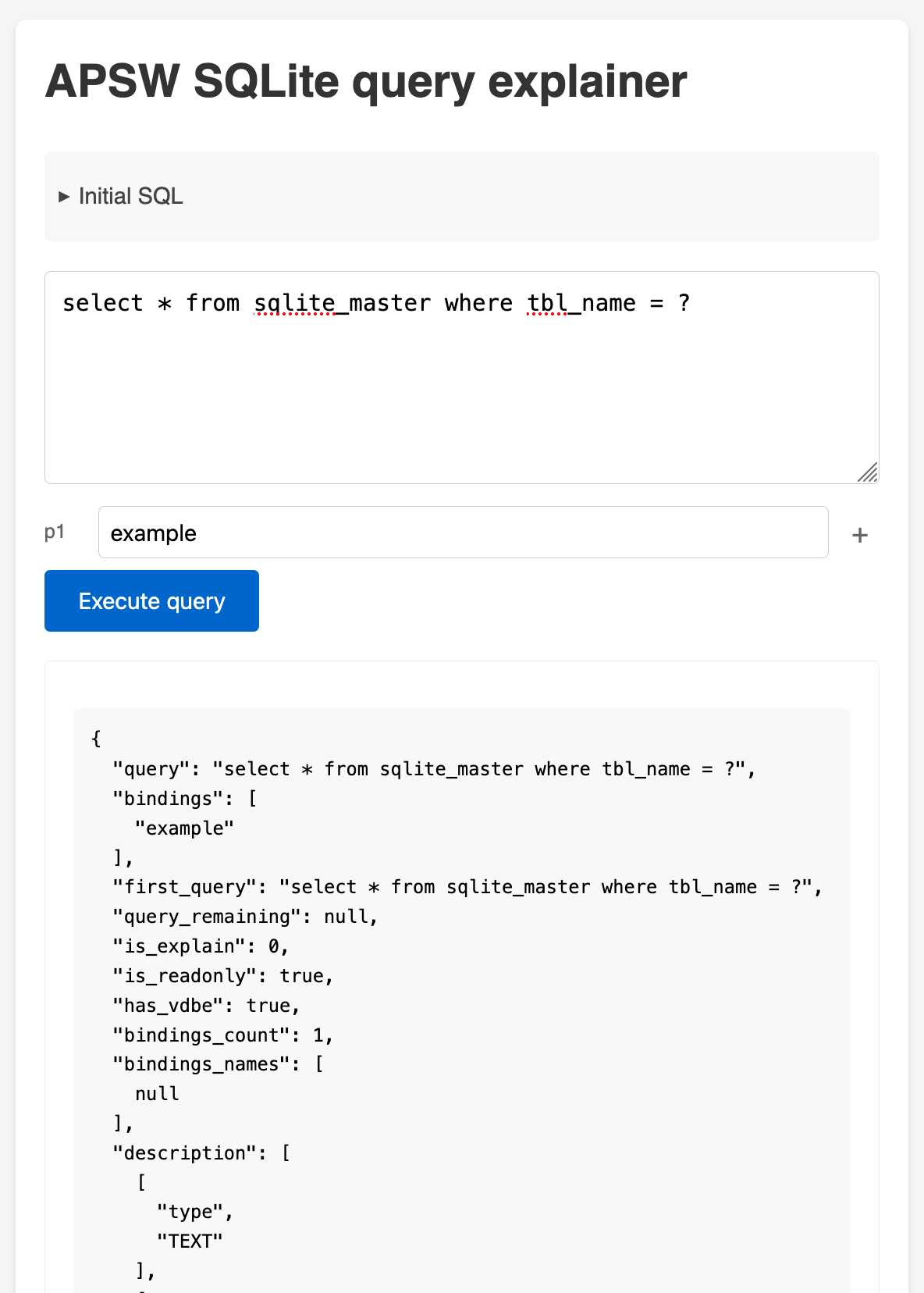
sqlite-page-explorer (via) Outstanding tool by Luke Rissacher for understanding the SQLite file format. Download the application (built using redbean and Cosmopolitan, so the same binary runs on Windows, Mac and Linux) and point it at a SQLite database to get a local web application with an interface for exploring how the file is structured.
Here's it running against the datasette.io/content database that runs the official Datasette website:
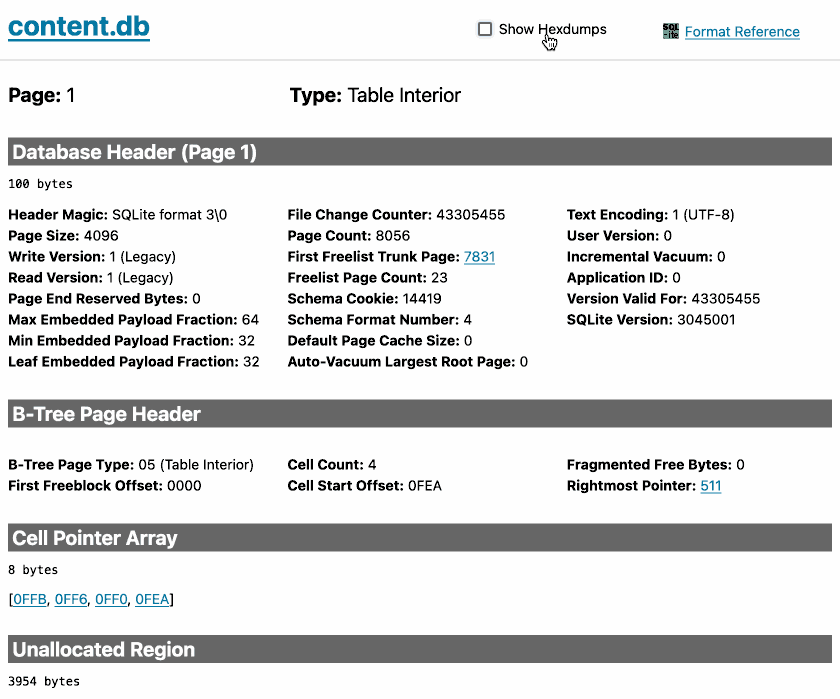
2024
Open WebUI. I tried out this open source (MIT licensed, JavaScript and Python) localhost UI for accessing LLMs today for the first time. It's very nicely done.
I ran it with uvx like this:
uvx --python 3.11 open-webui serve
On first launch it installed a bunch of dependencies and then downloaded 903MB to ~/.cache/huggingface/hub/models--sentence-transformers--all-MiniLM-L6-v2 - a copy of the all-MiniLM-L6-v2 embedding model, presumably for its RAG feature.
It then presented me with a working Llama 3.2:3b chat interface, which surprised me because I hadn't spotted it downloading that model. It turns out that was because I have Ollama running on my laptop already (with several models, including Llama 3.2:3b, already installed) - and Open WebUI automatically detected Ollama and gave me access to a list of available models.
I found a "knowledge" section and added all of the Datasette documentation (by dropping in the .rst files from the docs) - and now I can type # in chat to search for a file, add that to the context and then ask questions about it directly.
I selected the spatialite.rst.txt file, prompted it with "How do I use SpatiaLite with Datasette" and got back this:
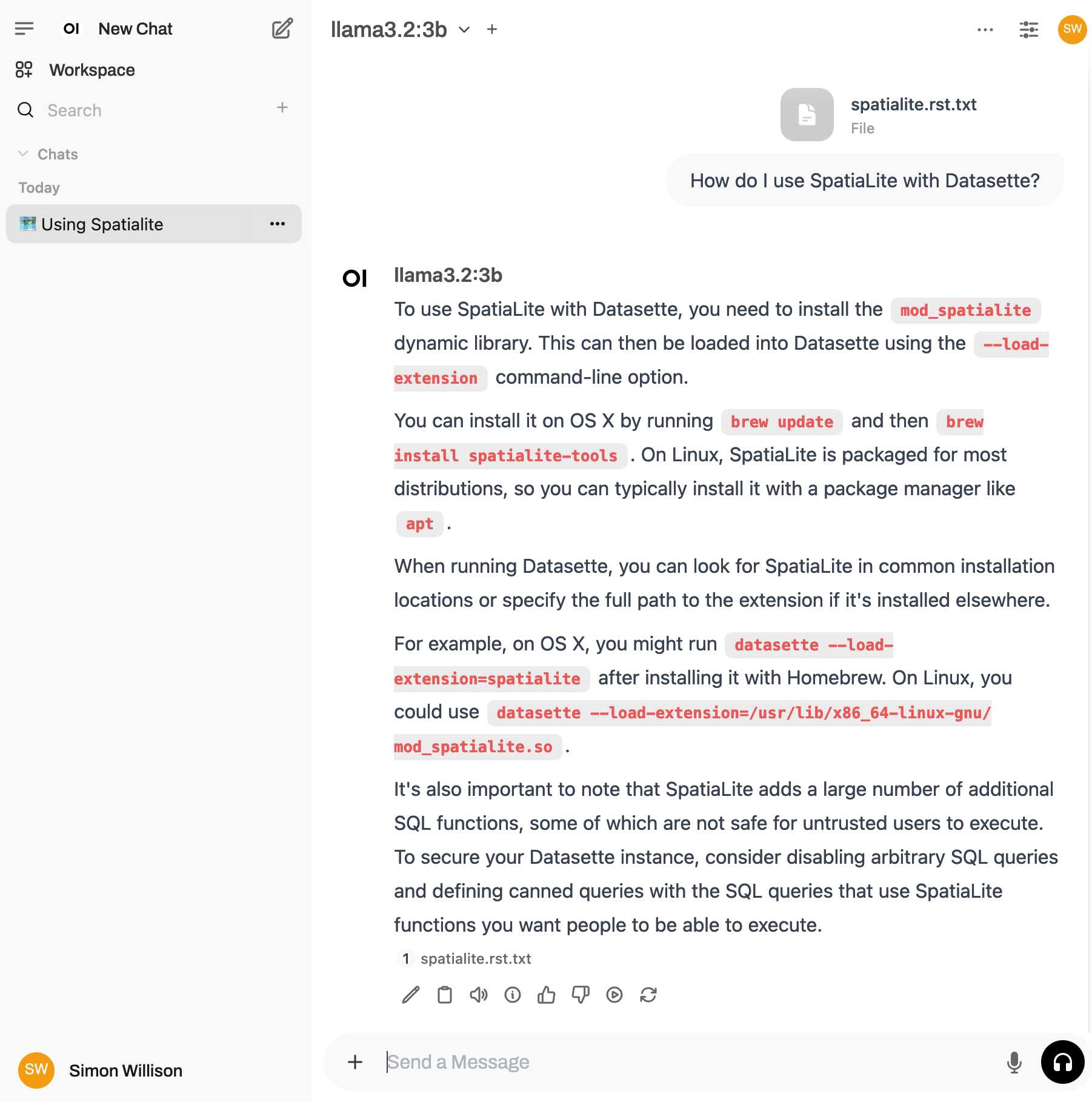
That's honestly a very solid answer, especially considering the Llama 3.2 3B model from Ollama is just a 1.9GB file! It's impressive how well that model can handle basic Q&A and summarization against text provided to it - it somehow has a 128,000 token context size.
Open WebUI has a lot of other tricks up its sleeve: it can talk to API models such as OpenAI directly, has optional integrations with web search and custom tools and logs every interaction to a SQLite database. It also comes with extensive documentation.
In search of a faster SQLite (via) Turso developer Avinash Sajjanshetty (previously) shares notes on the April 2024 paper Serverless Runtime / Database Co-Design With Asynchronous I/O by Turso founder and CTO Pekka Enberg, Jon Crowcroft, Sasu Tarkoma and Ashwin Rao.
The theme of the paper is rearchitecting SQLite for asynchronous I/O, and Avinash describes it as "the foundational paper behind Limbo, the SQLite rewrite in Rust."
From the paper abstract:
We propose rearchitecting SQLite to provide asynchronous byte-code instructions for I/O to avoid blocking in the library and de-coupling the query and storage engines to facilitate database and serverless runtime co-design. Our preliminary evaluation shows up to a 100x reduction in tail latency, suggesting that our approach is conducive to runtime/database co-design for low latency.
Introducing Limbo: A complete rewrite of SQLite in Rust (via) This looks absurdly ambitious:
Our goal is to build a reimplementation of SQLite from scratch, fully compatible at the language and file format level, with the same or higher reliability SQLite is known for, but with full memory safety and on a new, modern architecture.
The Turso team behind it have been maintaining their libSQL fork for two years now, so they're well equipped to take on a challenge of this magnitude.
SQLite is justifiably famous for its meticulous approach to testing. Limbo plans to take an entirely different approach based on "Deterministic Simulation Testing" - a modern technique pioneered by FoundationDB and now spearheaded by Antithesis, the company Turso have been working with on their previous testing projects.
Another bold claim (emphasis mine):
We have both added DST facilities to the core of the database, and partnered with Antithesis to achieve a level of reliability in the database that lives up to SQLite’s reputation.
[...] With DST, we believe we can achieve an even higher degree of robustness than SQLite, since it is easier to simulate unlikely scenarios in a simulator, test years of execution with different event orderings, and upon finding issues, reproduce them 100% reliably.
The two most interesting features that Limbo is planning to offer are first-party WASM support and fully asynchronous I/O:
SQLite itself has a synchronous interface, meaning driver authors who want asynchronous behavior need to have the extra complication of using helper threads. Because SQLite queries tend to be fast, since no network round trips are involved, a lot of those drivers just settle for a synchronous interface. [...]
Limbo is designed to be asynchronous from the ground up. It extends
sqlite3_step, the main entry point API to SQLite, to be asynchronous, allowing it to return to the caller if data is not ready to consume immediately.
Datasette provides an async API for executing SQLite queries which is backed by all manner of complex thread management - I would be very interested in a native asyncio Python library for talking to SQLite database files.
I successfully tried out Limbo's Python bindings against a demo SQLite test database using uv like this:
uv run --with pylimbo python
>>> import limbo
>>> conn = limbo.connect("/tmp/demo.db")
>>> cursor = conn.cursor()
>>> print(cursor.execute("select * from foo").fetchall())
It crashed when I tried against a more complex SQLite database that included SQLite FTS tables.
The Python bindings aren't yet documented, so I piped them through LLM and had the new google-exp-1206 model write this initial documentation for me:
files-to-prompt limbo/bindings/python -c | llm -m gemini-exp-1206 -s 'write extensive usage documentation in markdown, including realistic usage examples'
Introducing the Model Context Protocol (via) Interesting new initiative from Anthropic. The Model Context Protocol aims to provide a standard interface for LLMs to interact with other applications, allowing applications to expose tools, resources (contant that you might want to dump into your context) and parameterized prompts that can be used by the models.
Their first working version of this involves the Claude Desktop app (for macOS and Windows). You can now configure that app to run additional "servers" - processes that the app runs and then communicates with via JSON-RPC over standard input and standard output.
Each server can present a list of tools, resources and prompts to the model. The model can then make further calls to the server to request information or execute one of those tools.
(For full transparency: I got a preview of this last week, so I've had a few days to try it out.)
The best way to understand this all is to dig into the examples. There are 13 of these in the modelcontextprotocol/servers GitHub repository so far, some using the Typesscript SDK and some with the Python SDK (mcp on PyPI).
My favourite so far, unsurprisingly, is the sqlite one. This implements methods for Claude to execute read and write queries and create tables in a SQLite database file on your local computer.
This is clearly an early release: the process for enabling servers in Claude Desktop - which involves hand-editing a JSON configuration file - is pretty clunky, and currently the desktop app and running extra servers on your own machine is the only way to try this out.
The specification already describes the next step for this: an HTTP SSE protocol which will allow Claude (and any other software that implements the protocol) to communicate with external HTTP servers. Hopefully this means that MCP will come to the Claude web and mobile apps soon as well.
A couple of early preview partners have announced their MCP implementations already:
- Cody supports additional context through Anthropic's Model Context Protocol
- The Context Outside the Code is the Zed editor's announcement of their MCP extensions.
Ask questions of SQLite databases and CSV/JSON files in your terminal
I built a new plugin for my sqlite-utils CLI tool that lets you ask human-language questions directly of SQLite databases and CSV/JSON files on your computer.
[... 723 words]Project: Civic Band—scraping and searching PDF meeting minutes from hundreds of municipalities
I interviewed Philip James about Civic Band, his “slowly growing collection of databases of the minutes from civic governments”. Philip demonstrated the site and talked through his pipeline for scraping and indexing meeting minutes from many different local government authorities around the USA.
[... 762 words]From Naptime to Big Sleep: Using Large Language Models To Catch Vulnerabilities In Real-World Code (via) Google's Project Zero security team used a system based around Gemini 1.5 Pro to find a previously unreported security vulnerability in SQLite (a stack buffer underflow), in time for it to be fixed prior to making it into a release.
A key insight here is that LLMs are well suited for checking for new variants of previously reported vulnerabilities:
A key motivating factor for Naptime and now for Big Sleep has been the continued in-the-wild discovery of exploits for variants of previously found and patched vulnerabilities. As this trend continues, it's clear that fuzzing is not succeeding at catching such variants, and that for attackers, manual variant analysis is a cost-effective approach.
We also feel that this variant-analysis task is a better fit for current LLMs than the more general open-ended vulnerability research problem. By providing a starting point – such as the details of a previously fixed vulnerability – we remove a lot of ambiguity from vulnerability research, and start from a concrete, well-founded theory: "This was a previous bug; there is probably another similar one somewhere".
LLMs are great at pattern matching. It turns out feeding in a pattern describing a prior vulnerability is a great way to identify potential new ones.
I'm of the opinion that you should never use mmap, because if you get an I/O error of some kind, the OS raises a signal, which SQLite is unable to catch, and so the process dies. When you are not using mmap, SQLite gets back an error code from an I/O error and is able to take remedial action, or at least compose an error message.
Supercharge the One Person Framework with SQLite: Rails World 2024 (via) Stephen Margheim shares an annotated transcript of the YouTube video of his recent talk at this year's Rails World conference in Toronto.
The Rails community is leaning hard into SQLite right now. Stephen's talk is some of the most effective evangelism I've seen anywhere for SQLite as a production database for web applications, highlighting several new changes in Rails 8:
... there are two additions coming with Rails 8 that merit closer consideration. Because these changes make Rails 8 the first version of Rails (and, as far as I know, the first version of any web framework) that provides a fully production-ready SQLite experience out-of-the-box.
Those changes: Ensure SQLite transaction default to IMMEDIATE mode to avoid "database is locked" errors when a deferred transaction attempts to upgrade itself with a write lock (discussed here previously, and added to Datasette 1.0a14 in August) and SQLite non-GVL-blocking, fair retry interval busy handler - a lower-level change that ensures SQLite's busy handler doesn't hold Ruby's Global VM Lock (the Ruby version of Python's GIL) while a thread is waiting on a SQLite lock.
The rest of the talk makes a passionate and convincing case for SQLite as an option for production deployments, in line with the Rails goal of being a One Person Framework - "a toolkit so powerful that it allows a single individual to create modern applications upon which they might build a competitive business".
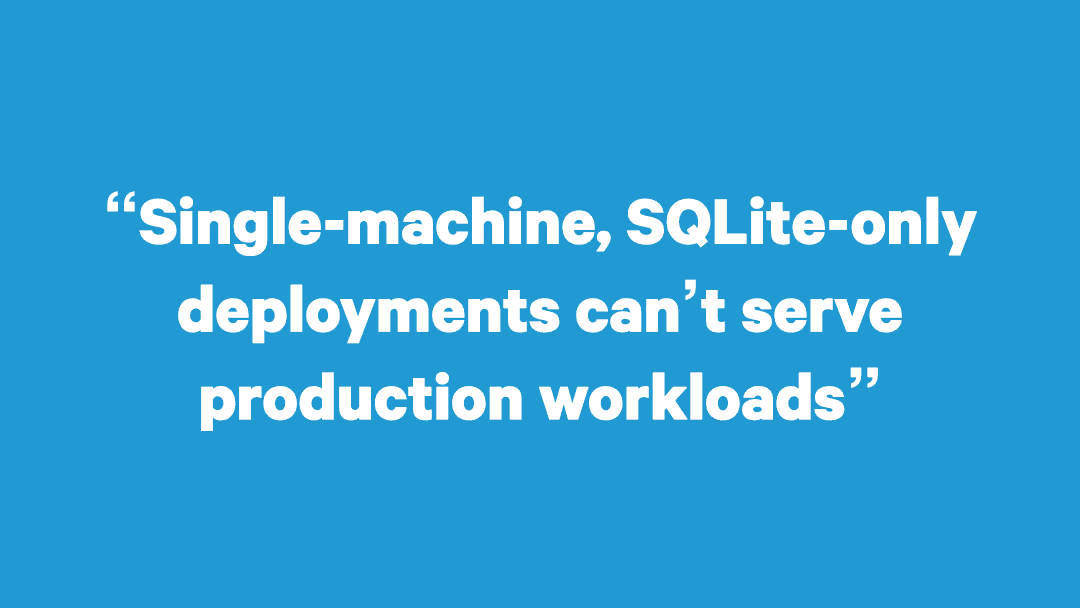
Back in April Stephen published SQLite on Rails: The how and why of optimal performance describing some of these challenges in more detail (including the best explanation I've seen anywhere of BEGIN IMMEDIATE TRANSACTION) and promising:
Unfortunately, running SQLite on Rails out-of-the-box isn’t viable today. But, with a bit of tweaking and fine-tuning, you can ship a very performant, resilient Rails application with SQLite. And my personal goal for Rails 8 is to make the out-of-the-box experience fully production-ready.
It looks like he achieved that goal!
Zero-latency SQLite storage in every Durable Object (via) Kenton Varda introduces the next iteration of Cloudflare's Durable Object platform, which recently upgraded from a key/value store to a full relational system based on SQLite.
For useful background on the first version of Durable Objects take a look at Cloudflare's durable multiplayer moat by Paul Butler, who digs into its popularity for building WebSocket-based realtime collaborative applications.
The new SQLite-backed Durable Objects is a fascinating piece of distributed system design, which advocates for a really interesting way to architect a large scale application.
The key idea behind Durable Objects is to colocate application logic with the data it operates on. A Durable Object comprises code that executes on the same physical host as the SQLite database that it uses, resulting in blazingly fast read and write performance.
How could this work at scale?
A single object is inherently limited in throughput since it runs on a single thread of a single machine. To handle more traffic, you create more objects. This is easiest when different objects can handle different logical units of state (like different documents, different users, or different "shards" of a database), where each unit of state has low enough traffic to be handled by a single object
Kenton presents the example of a flight booking system, where each flight can map to a dedicated Durable Object with its own SQLite database - thousands of fresh databases per airline per day.
Each DO has a unique name, and Cloudflare's network then handles routing requests to that object wherever it might live on their global network.
The technical details are fascinating. Inspired by Litestream, each DO constantly streams a sequence of WAL entries to object storage - batched every 16MB or every ten seconds. This also enables point-in-time recovery for up to 30 days through replaying those logged transactions.
To ensure durability within that ten second window, writes are also forwarded to five replicas in separate nearby data centers as soon as they commit, and the write is only acknowledged once three of them have confirmed it.
The JavaScript API design is interesting too: it's blocking rather than async, because the whole point of the design is to provide fast single threaded persistence operations:
let docs = sql.exec(`
SELECT title, authorId FROM documents
ORDER BY lastModified DESC
LIMIT 100
`).toArray();
for (let doc of docs) {
doc.authorName = sql.exec(
"SELECT name FROM users WHERE id = ?",
doc.authorId).one().name;
}This one of their examples deliberately exhibits the N+1 query pattern, because that's something SQLite is uniquely well suited to handling.
The system underlying Durable Objects is called Storage Relay Service, and it's been powering Cloudflare's existing-but-different D1 SQLite system for over a year.
I was curious as to where the objects are created. According to this (via Hacker News):
Durable Objects do not currently change locations after they are created. By default, a Durable Object is instantiated in a data center close to where the initial
get()request is made. [...] To manually create Durable Objects in another location, provide an optionallocationHintparameter toget().
And in a footnote:
Dynamic relocation of existing Durable Objects is planned for the future.
where.durableobjects.live is a neat site that tracks where in the Cloudflare network DOs are created - I just visited it and it said:
This page tracks where new Durable Objects are created; for example, when you loaded this page from Half Moon Bay, a worker in San Jose, California, United States (SJC) created a durable object in San Jose, California, United States (SJC).
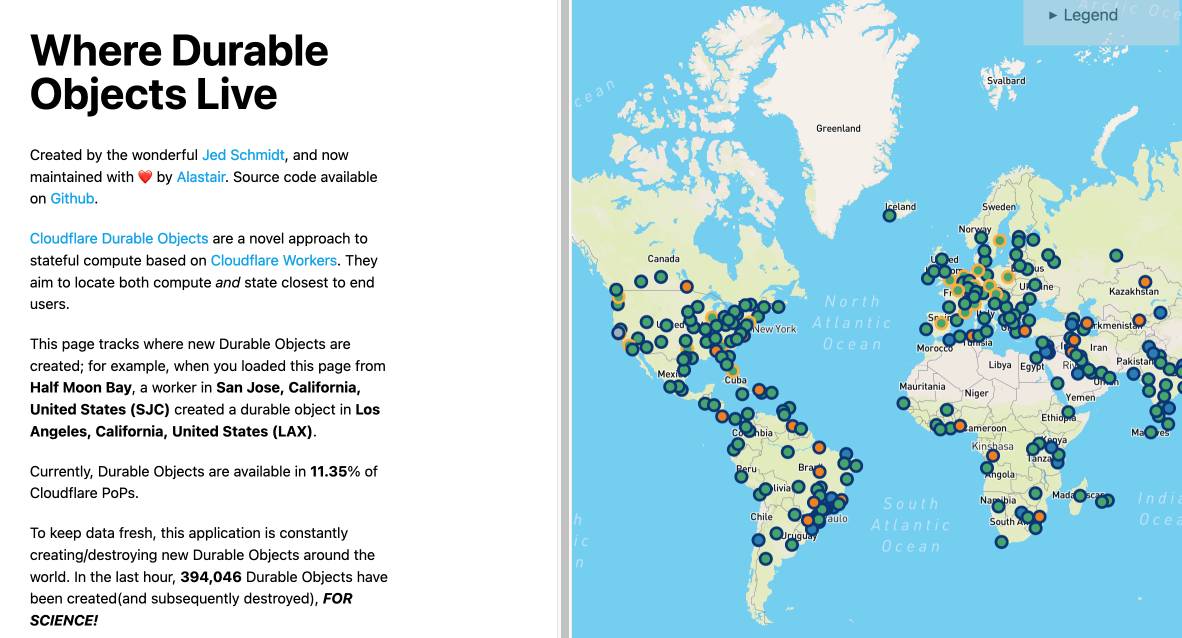
PostgreSQL 17: SQL/JSON is here! (via) Hubert Lubaczewski dives into the new JSON features added in PostgreSQL 17, released a few weeks ago on the 26th of September. This is the latest in his long series of similar posts about new PostgreSQL features.
The features are based on the new SQL:2023 standard from June 2023. If you want to actually read the specification for SQL:2023 it looks like you have to buy a PDF from ISO for 194 Swiss Francs (currently $226). Here's a handy summary by Peter Eisentraut: SQL:2023 is finished: Here is what's new.
There's a lot of neat stuff in here. I'm particularly interested in the json_table() table-valued function, which can convert a JSON string into a table with quite a lot of flexibility. You can even specify a full table schema as part of the function call:
SELECT * FROM json_table(
'[{"a":10,"b":20},{"a":30,"b":40}]'::jsonb,
'$[*]'
COLUMNS (
id FOR ORDINALITY,
column_a int4 path '$.a',
column_b int4 path '$.b',
a int4,
b int4,
c text
)
);SQLite has solid JSON support already and often imitates PostgreSQL features, so I wonder if we'll see an update to SQLite that reflects some aspects of this new syntax.
otterwiki (via) It's been a while since I've seen a new-ish Wiki implementation, and this one by Ralph Thesen is really nice. It's written in Python (Flask + SQLAlchemy + mistune for Markdown + GitPython) and keeps all of the actual wiki content as Markdown files in a local Git repository.
The installation instructions are a little in-depth as they assume a production installation with Docker or systemd - I figured out this recipe for trying it locally using uv:
git clone https://github.com/redimp/otterwiki.git
cd otterwiki
mkdir -p app-data/repository
git init app-data/repository
echo "REPOSITORY='${PWD}/app-data/repository'" >> settings.cfg
echo "SQLALCHEMY_DATABASE_URI='sqlite:///${PWD}/app-data/db.sqlite'" >> settings.cfg
echo "SECRET_KEY='$(echo $RANDOM | md5sum | head -c 16)'" >> settings.cfg
export OTTERWIKI_SETTINGS=$PWD/settings.cfg
uv run --with gunicorn gunicorn --bind 127.0.0.1:8080 otterwiki.server:app
What’s New In Python 3.13. It's Python 3.13 release day today. The big signature features are a better REPL with improved error messages, an option to run Python without the GIL and the beginnings of the new JIT. Here are some of the smaller highlights I spotted while perusing the release notes.
iOS and Android are both now Tier 3 supported platforms, thanks to the efforts of Russell Keith-Magee and the Beeware project. Tier 3 means "must have a reliable buildbot" but "failures on these platforms do not block a release". This is still a really big deal for Python as a mobile development platform.
There's a whole bunch of smaller stuff relevant to SQLite.
Python's dbm module has long provided a disk-backed key-value store against multiple different backends. 3.13 introduces a new backend based on SQLite, and makes it the default.
>>> import dbm
>>> db = dbm.open("/tmp/hi", "c")
>>> db["hi"] = 1The "c" option means "Open database for reading and writing, creating it if it doesn’t exist".
After running the above, /tmp/hi was a SQLite database containing the following data:
sqlite3 /tmp/hi .dump
PRAGMA foreign_keys=OFF;
BEGIN TRANSACTION;
CREATE TABLE Dict (
key BLOB UNIQUE NOT NULL,
value BLOB NOT NULL
);
INSERT INTO Dict VALUES(X'6869',X'31');
COMMIT;
The dbm.open() function can detect which type of storage is being referenced. I found the implementation for that in the whichdb(filename) function.
I was hopeful that this change would mean Python 3.13 deployments would be guaranteed to ship with a more recent SQLite... but it turns out 3.15.2 is from November 2016 so still quite old:
SQLite 3.15.2 or newer is required to build the
sqlite3extension module. (Contributed by Erlend Aasland in gh-105875.)
The conn.iterdump() SQLite method now accepts an optional filter= keyword argument taking a LIKE pattern for the tables that you want to dump. I found the implementation for that here.
And one last change which caught my eye because I could imagine having code that might need to be updated to reflect the new behaviour:
pathlib.Path.glob()andrglob()now return both files and directories if a pattern that ends with "**" is given, rather than directories only. Add a trailing slash to keep the previous behavior and only match directories.
With the release of Python 3.13, Python 3.8 is officially end-of-life. Łukasz Langa:
If you're still a user of Python 3.8, I don't blame you, it's a lovely version. But it's time to move on to newer, greater things. Whether it's typing generics in built-in collections, pattern matching,
except*, low-impact monitoring, or a new pink REPL, I'm sure you'll find your favorite new feature in one of the versions we still support. So upgrade today!
What’s New in Ruby on Rails 8 (via)
Rails 8 takes SQLite from a lightweight development tool to a reliable choice for production use, thanks to extensive work on the SQLite adapter and Ruby driver.
With the introduction of the solid adapters discussed above, SQLite now has the capability to power Action Cable, Rails.cache, and Active Job effectively, expanding its role beyond just prototyping or testing environments. [...]
- Transactions default to
IMMEDIATEmode to improve concurrency.
Also included in Rails 8: Kamal, a new automated deployment system by 37signals for self-hosting web applications on hardware or virtual servers:
Kamal basically is Capistrano for Containers, without the need to carefully prepare servers in advance. No need to ensure that the servers have just the right version of Ruby or other dependencies you need. That all lives in the Docker image now. You can boot a brand new Ubuntu (or whatever) server, add it to the list of servers in Kamal, and it’ll be auto-provisioned with Docker, and run right away.
More from the official blog post about the release:
At 37signals, we're building a growing suite of apps that use SQLite in production with ONCE. There are now thousands of installations of both Campfire and Writebook running in the wild that all run SQLite. This has meant a lot of real-world pressure on ensuring that Rails (and Ruby) is working that wonderful file-based database as well as it can be. Through proper defaults like WAL and IMMEDIATE mode. Special thanks to Stephen Margheim for a slew of such improvements and Mike Dalessio for solving a last-minute SQLite file corruption issue in the Ruby driver.
Database Remote-Copy Tool For SQLite (draft)
(via)
Neat new SQLite utilities often show up in branches of the SQLite repository. Here's a new one from last month: sqlite3-rsync, providing tools for efficiently creating and updating copies of WAL-mode SQLite databases on either the same machine or across remote machines via SSH.
The way it works is neat, inspired by rsync (hence the tool's name):
The protocol is for the replica to send a cryptographic hash of each of its pages over to the origin side, then the origin sends back the complete content of any page for which the hash does not match.
SQLite's default page size is 4096 bytes and a hash is 20 bytes, so if nothing has changed then the client will transmit 0.5% of the database size in hashes and get nothing back in return.
The tool takes full advantage of SQLite's WAL mode - when you run it you'll get an exact snapshot of the database state as it existed at the moment the copy was initiated, even if the source database continues to apply changes.
I wrote up a TIL on how to compile it - short version:
cd /tmp
git clone https://github.com/sqlite/sqlite.git
cd sqlite
git checkout sqlite3-rsync
./configure
make sqlite3.c
cd tool
gcc -o sqlite3-rsync sqlite3-rsync.c ../sqlite3.c -DSQLITE_ENABLE_DBPAGE_VTAB
./sqlite3-rsync --help
Update: It turns out you can now just run ./configure && make sqlite_rsync in the root checkout.
Something I’ve worried about in the past is that if I want to make a snapshot backup of a SQLite database I need enough additional free disk space to entirely duplicate the current database first (using the backup mechanism or VACUUM INTO). This tool fixes that - I don’t need any extra disk space at all, since the pages that have been updated will be transmitted directly over the wire in 4096 byte chunks.
I tried feeding the 1800 lines of C through OpenAI’s o1-preview with the prompt “Explain the protocol over SSH part of this” and got a pretty great high level explanation - markdown copy here.
Hybrid full-text search and vector search with SQLite. As part of Alex’s work on his sqlite-vec SQLite extension - adding fast vector lookups to SQLite - he’s been investigating hybrid search, where search results from both vector similarity and traditional full-text search are combined together.
The most promising approach looks to be Reciprocal Rank Fusion, which combines the top ranked items from both approaches. Here’s Alex’s SQL query:
-- the sqlite-vec KNN vector search results
with vec_matches as (
select
article_id,
row_number() over (order by distance) as rank_number,
distance
from vec_articles
where
headline_embedding match lembed(:query)
and k = :k
),
-- the FTS5 search results
fts_matches as (
select
rowid,
row_number() over (order by rank) as rank_number,
rank as score
from fts_articles
where headline match :query
limit :k
),
-- combine FTS5 + vector search results with RRF
final as (
select
articles.id,
articles.headline,
vec_matches.rank_number as vec_rank,
fts_matches.rank_number as fts_rank,
-- RRF algorithm
(
coalesce(1.0 / (:rrf_k + fts_matches.rank_number), 0.0) * :weight_fts +
coalesce(1.0 / (:rrf_k + vec_matches.rank_number), 0.0) * :weight_vec
) as combined_rank,
vec_matches.distance as vec_distance,
fts_matches.score as fts_score
from fts_matches
full outer join vec_matches on vec_matches.article_id = fts_matches.rowid
join articles on articles.rowid = coalesce(fts_matches.rowid, vec_matches.article_id)
order by combined_rank desc
)
select * from final;I’ve been puzzled in the past over how to best do that because the distance scores from vector similarity and the relevance scores from FTS are meaningless in comparison to each other. RRF doesn’t even attempt to compare them - it uses them purely for row_number() ranking within each set and combines the results based on that.
django-plugin-datasette. I did some more work on my DJP plugin mechanism for Django at the DjangoCon US sprints today. I added a new plugin hook, asgi_wrapper(), released in DJP 0.3 and inspired by the similar hook in Datasette.
The hook only works for Django apps that are served using ASGI. It allows plugins to add their own wrapping ASGI middleware around the Django app itself, which means they can do things like attach entirely separate ASGI-compatible applications outside of the regular Django request/response cycle.
Datasette is one of those ASGI-compatible applications!
django-plugin-datasette uses that new hook to configure a new URL, /-/datasette/, which serves a full Datasette instance that scans through Django’s settings.DATABASES dictionary and serves an explore interface on top of any SQLite databases it finds there.
It doesn’t support authentication yet, so this will expose your entire database contents - probably best used as a local debugging tool only.
I did borrow some code from the datasette-mask-columns plugin to ensure that the password column in the auth_user column is reliably redacted. That column contains a heavily salted hashed password so exposing it isn’t necessarily a disaster, but I like to default to keeping hashes safe.
We used this model [periodically transmitting configuration to different hosts] to distribute translations, feature flags, configuration, search indexes, etc at Airbnb. But instead of SQLite we used Sparkey, a KV file format developed by Spotify. In early years there was a Cron job on every box that pulled that service’s thingies; then once we switched to Kubernetes we used a daemonset & host tagging (taints?) to pull a variety of thingies to each host and then ensure the services that use the thingies only ran on the hosts that had the thingies.
